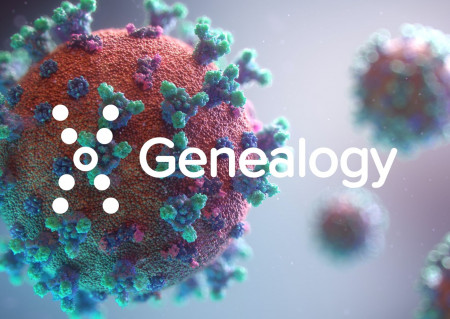Genealogy and Pulse Active Stations Partner to Examine Genetic Impact on COVID-19 Severity
As COVID-19 continues to impact India's population, Genealogy and Pulse are teaming up to study how genetics plays a role in the severity of the virus.

NEW YORK, June 11, 2021 (Newswire.com) - Genealogy Inc. has been making waves in the world of bioinformatics for its efficient use of whole-genome and high-definition HLA sequencing capabilities. Their platform utilizes AI technology to accurately predict a person's risk of developing genetic diseases and their genetic risk for cancer, at a fraction of the cost of traditional testing methods.
Using cutting-edge AI algorithms, Genealogy can generate a person's "Polygenic Risk Score," or PRS, which can accurately predict the severity of COVID-19 symptoms based on genetic risk. They have completed their tech development phase and are prepared to apply it to a real-world scenario.
Recently, the company has shifted its focus to the deadly COVID-19 virus in hopes of using their revolutionary algorithms to predict which viral infections could severely impact certain individuals as well as their potential response to mRNA vaccinations.
The biotech company has developed its core technology with the goal of testing and preventing further death in high-impact countries, such as India. India continues to report an average of 58,000 cases per day and most experts expect the reported cases to peak around mid-June.
In an effort to curb the severe cases and hospitalizations in India, Genealogy is partnering with Pulse Active Stations to genetically determine what makes infections more severe for some people or symptomless for others.
In their initial rollout, the companies analyzed Pulse's 450,000 strong user base across 150 cities to identify groups of infected individuals that showed no symptoms, those who showed mild symptoms, and those who required hospitalization.
Identifying the PRS in patients of varying levels of COVID severity will provide a more detailed look into the causes of symptoms, as well as possible treatment options. In addition, the partnership between Genealogy and Pulse will provide valuable insights into India's underserved healthcare markets and produce a helpful glimpse into how the virus affects populations.
Earlier this year, India broke worldwide records for both new infections and deaths from coronavirus. The country ranks 102nd globally for genetic sequencing and uploads just .49 sequences per 1,000 cases. Sequencing efforts could be significantly increased by using artificial intelligence algorithms to "impute" or predict datasets for the population as a whole.
Current research highlights two key areas where genetics could impact the severity of COVID: chances of developing life-threatening inflammation and the chances of getting infected in the first place.
Simply put, some people seem to have a greater likelihood of developing severe COVID symptoms if they have a particular genetic makeup. But, unfortunately, researchers have not pinpointed precisely which genes are responsible for creating extreme symptoms in some cases while almost nonexistent in others.
Additionally, the lack of diverse research becomes apparent when considering all of the ethnically unique genomes present outside of North America, the epicenter of research.
To solve the diversity issue in genetic COVID-19 studies, Genealogy CEO Andrew Chi and Joginder Tanikella, CEO of India's Pulse, have joined forces to research the Indian population and their genetic sensitivities to the coronavirus. Together, Genealogy and Pulse will be the first bioinformatics team to examine the genetic causes of COVID severity among the Indian population.
As the reported cases in India continue to swell, the country of 1.3 billion people has reported nearly 29 million confirmed cases to date. The vaccine rollout has provided little relief, and government officials don't expect to reach full coverage until the end of 2021.
By applying their precision health methods, Genealogy hopes to use their technology to identify individuals with a greater risk of developing severe reactions to COVID and vaccinate that at-risk group as a priority.
Additionally, using a cost-effective saliva testing method to accurately predict HLA genotype information, the company can glean a wealth of information about the human immune system. This information will be invaluable to predict negative vaccine responses using genetic data and to determine who should receive priority vaccination in the event of another global pandemic.
Genealogy expects to finalize its AI pipeline by the end of 2021, which could be expanded to predict the severity of viral reactions, as well as the efficacy of vaccinations for influenza and other deadly coronaviruses. Furthermore, CEO Andrew Chi hopes that this technology could be used to save millions of lives should another deadly pandemic occur.
Source: Genealogy Inc.